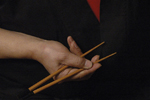 When I found my library stocked Akira Kurosawa’s “Seven Samurai” I was psyched! When I found that this Criterion Collection had 3 DVDs stocked with extras including a tag-team of different commentators, and several documentaries about Kurosawa, I was even more excited! Imagine having everything I could possibly want to know about one of the greatest films, by one of the world’s greatest directors (“SS” was one of Kurosawa’s personal favorites.) Before you see “SS,” try to get the Criterion version which has the full 3+1/2 hours of Kurosawa’s vision. I know, 3+1/2 hours of a foreign film seems like a lot, but honestly, when it was over, I could have easily watched more. Most of the reason it has to be this long is “SS” has many good characters (in addition to the main seven samurai, there are many villagers) who play important roles and are worth every bit of Kurosawa’s rich exploration and development.
When I found my library stocked Akira Kurosawa’s “Seven Samurai” I was psyched! When I found that this Criterion Collection had 3 DVDs stocked with extras including a tag-team of different commentators, and several documentaries about Kurosawa, I was even more excited! Imagine having everything I could possibly want to know about one of the greatest films, by one of the world’s greatest directors (“SS” was one of Kurosawa’s personal favorites.) Before you see “SS,” try to get the Criterion version which has the full 3+1/2 hours of Kurosawa’s vision. I know, 3+1/2 hours of a foreign film seems like a lot, but honestly, when it was over, I could have easily watched more. Most of the reason it has to be this long is “SS” has many good characters (in addition to the main seven samurai, there are many villagers) who play important roles and are worth every bit of Kurosawa’s rich exploration and development.
“Seven Samurai (1954)” is considered by many to be the greatest Japanese film ever made. It revolutionized Kurosawa’s career and allowed him to make the “Jidai Geki” or “Period-style Film” truly his own. “SS” went on to inspire many films, (the first being its American remake “The Magnificent Seven” 1960.)
The story takes place in 1467, feudal Japan, during a time of civil war. “Ronin” or masterless samurai, threaten to sack a village of farmers as soon as the harvest is in. The farmers, incapable of defending themselves, attempt to bribe other starving “ronin” with their meager supplies of food too help defend their village, when the time comes to do so. The villagers are impressed with the heroic actions of Kanbê (played by Takashi Shimura) a samurai who rescues a woman and her child from a kidnapper, by posing as a Buddhist monk. Kanbê proves to be everything right with the code of Bushido (warrior code of ethics of a samurai) he lives by. He is wise, strong, even-tempered, kind, patient, funny, a brilliant strategist, and a perfect leader. He puts other ronin through trials to test their spirit and ability and soon comes up with a team of seven to help the villagers. Each of these has a distinct personality and ability that adds to the group. These skills will all come into play as the bandits raiding the village outnumber the samurai about 6:1!
This film has been criticized as being anti-democratic, but I think that falls a little flat considering the time period Kurosawa made this. Certainly, a anti-democratic film would do nothing for Japan, at this time, and would have been a flop in foreign markets, if this were true. I think “Seven Samurai” is a film about people at their best: individuals who come together with stoicism under hard times. The seven become a group to protect the defenseless with strength, honor and integrity. The film actually shows the flaws of a feudal caste system and the ultimate downfall of the samurai because of them.
A suggestion: watch it through and then watch it again with the commentary, which is full of insights of Japanese culture and history and tons of film facts! While doing research for this article, I found another remake is in production this year, set in modern day Thailand. No, PLEASE! Not necessary! I guess Hollywood is running outta good stories!
…and if the term “Jidai Geki” seems a little familiar to you, so did it to me, as well. A little checking on the “Star Wars” fanboy sites confirmed that this is where Lucas came up with the term: “Jedi!”






























